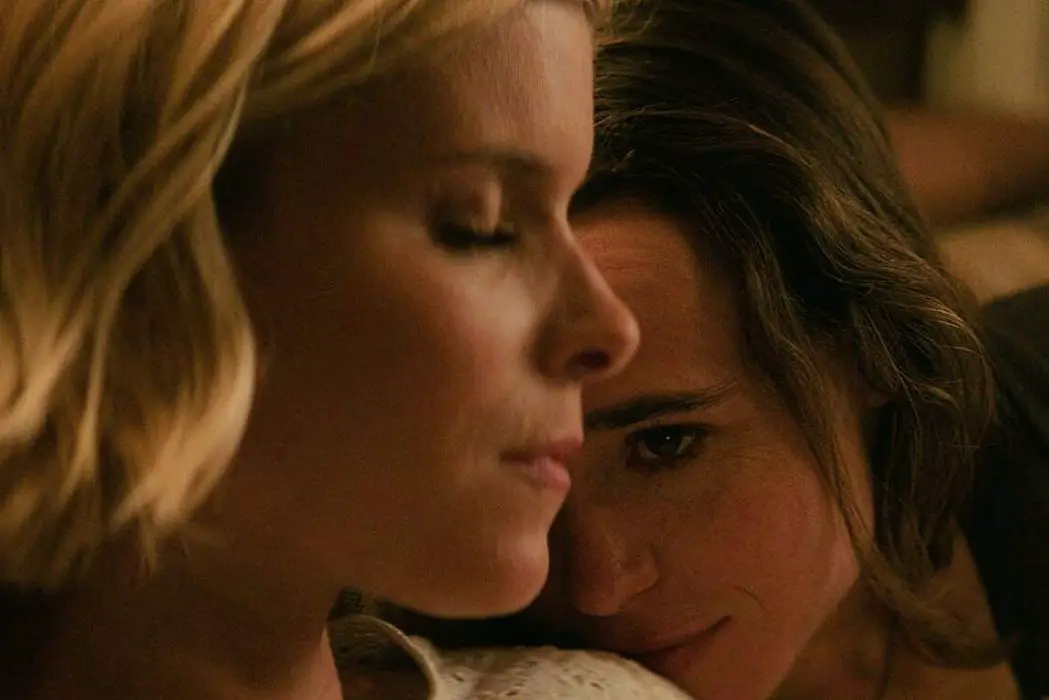MY DAYS OF MERCY: Love Finds A Way

Alex is a film addict, TV aficionado, and book lover.…
Having a queer film sit in the can for nearly two years must be a terrifying thing in today’s world. Politics both on and off the screen are moving rapidly, and with that comes changing expectations for these movies. Add in the varying desires of casual audiences, representation-oriented critics, and the queer community itself and you’ve got a small, constantly moving target to hit if you want to make a satisfying film.
And I know, art is not beholden to majority rule or even to representation standards, but it is good if your film can find its place in the market. Just look at what happened to My Days of Mercy: an Ellen Page and Kate Mara starring drama that premiered at TIFF 2017 to fairly strong reviews is just now getting a limited theatrical and VOD release stateside, and that’s in large part because it doesn’t really fit into today’s marketplace.
The film not only has a gentle, queer love story that feels a bit retro, it also takes on the ever-marketable death penalty debate (rake in those dollars, baby). You see, the lovebirds meet at an execution, with Page’s Lucy protesting for abolishing the practice and Mara’s Mercy there in support. Their differences don’t lead to histrionics or finger-pointing, instead taking the route of level-headed disagreements and across the aisle understanding. It’s this tenor that pushes it out of vogue more than its faults, and in the end its inability to find a market means we’ll overlook a film willing to take a loving but wide-eyed look at a complicated scenario.
Performances Rule The Day
For all its hefty plot elements, My Days of Mercy is, at its heart, a character piece. Namely, it takes a long look at Page’s Lucy, a young person adrift in small-town middle America. Trauma stemming from her mother’s death and her father sitting on death row has left her closed off, and its her slow awakening that really drives the film forward.

It’s unfortunate, then, that Page is the one that struggles most with her role. Given her body of work, I wouldn’t classify her as a performer with great range, and a character as shut down as Lucy requires subtle work that is a bit beyond her. She can handle the more straightforward scenes of love and grief, but whenever her character is shifting and growing she fails to make those leaps feel natural.
Picking up that slack is Mara and Amy Seimetz, who handle the prickly moments with much greater ease. Seimetz in particular does a lot with her screen time, playing the elder sister in she and Page’s broken family with a self-assuredness that slowly deteriorates to reveal the desperation that requires it. The two sisters were left with a young brother to raise when their father was arrested, and she was no more ready to deal with their messed up situation than her sister.
That Seimetz is able to clearly get across her family’s predicament and Mara is able to sell the love story means each storyline gets the fleshing out it needs, it just isn’t coming from the right person.
A Formulaic Love Story Still Warms The Heart
While this may make My Days of Mercy sound like a depressing watch (and, let’s face it, it kind of is), the love story is vibrant enough to break through the gloom. Anyone familiar with queer cinema will know its beats by heart: tentative flirtation and longing glances make for some extended foreplay, and once they finally give in hidden complications threaten to pull them apart. This is small-town America, and the life of an openly queer person here isn’t as simple as it is in other places.

Because films routinely ignore this area of the country, the lives of these two may feel like something from queer cinema of five or ten years ago. That doesn’t mean it’s inaccurate, however. The two characters are living in Ohio and Illinois, and with me located smack in the middle of their imagined romance, I can attest that there’s still plenty of people figuring it out like they are.
Even if their romance does move a bit slow to you, there’s a consistent sweetness to it that makes it easy to root for. The chemistry between Mara and Page is of an easygoing nature (they’re friends in real life and produced this so they could work together), and their comfortable fit goes a long way to explaining why the two stay together despite butting heads over some pretty serious issues.
Balancing Pain And Love
Where the love story is pretty straightforward, the way this film addresses the death penalty debate is anything but. Granted, that’s kind of a necessity; we’re rooting for lovers on opposing sides, so we need to at least understand where each person is coming from. The film gives them valid reasons for having and sticking to their beliefs, and it’s smart enough to let the emotional beats of the story speak to its overarching stance instead of inserting its own lecturing.

The restraint this takes, along with knowing when to hit these charged moments and when to back away, is one of the great strengths of My Days of Mercy and almost certainly comes from director Tali Shalom-Ezer. She manages to entwine Lucy’s growing infatuation and distress over her father’s situation so that the two storylines never feel separate, and the resulting emotional floodgate is all the more satisfying because of it. It’s a task easier said than done, but then again, love and pain do sort of go together.
Conclusion: My Days Of Mercy
Heady problems put the characters in My Days of Mercy through the wringer, but the clarity with which they are captured makes the difficult journey more poignant. Seimetz and Mara particularly shine, handling their complicated roles with ease. Shalom-Ezer keeps the film tethered together, even when minor problems threaten to push it out of its delicate orbit. She had a good grasp of this film’s scope, and she never lets the difficult material overwhelm her vision.
What did you think of My Days of Mercy? Do you think it balanced its storylines well? Let us know in the comments!
My Days of Mercy is out now in the US and the UK.
Does content like this matter to you?
Become a Member and support film journalism. Unlock access to all of Film Inquiry`s great articles. Join a community of like-minded readers who are passionate about cinema - get access to our private members Network, give back to independent filmmakers, and more.
Alex is a film addict, TV aficionado, and book lover. He's perfecting his cat dad energy.













